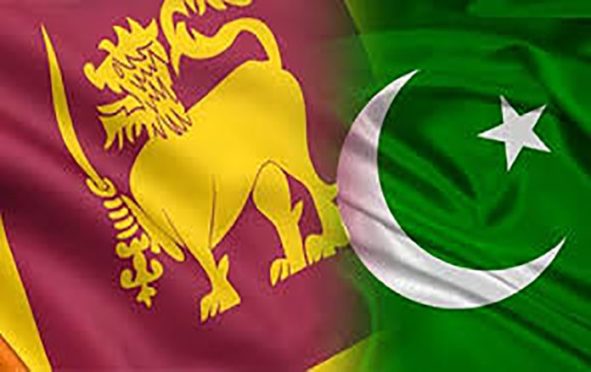Ties that bind and ties that endure
An overview –Pakistan-Sri Lanka relations and visit of Prime Minister Imran Khan to Sri Lanka
Connection between the people of Pakistan and Sri Lanka are rooted deep in history. Buddhism had flourished in areas that became Pakistan and the Muslims traders, in the early years of Islam, had been familiar with Serendib from where they took Spices and Gems to the Middle East and Europe.
This tradition of goodwill continued in the years after the two countries gained independence, when Sri Lanka also became the port of call on the 3,000-mile of ocean route between the two wings of Pakistan. On February 1948, in a message on Sri Lanka’s independence, Quid-e-Azam Muhammad Ali Jinnah aptly described the nature of Pakistan – Sri Lankan relations.
He said “Pakistan has the warmest goodwill towards Ceylon, and I am sanguine that the good feelings which exist between our two people will be further strengthen as the years roll by and out common interests, and mutual and reciprocal handling of them, will bring us into still closer friendship”.
When the liberation war broke out in East Pakistan in 1971, and India had banned over-flights by Pakistani aircraft, the then Sri Lanka Freedom Party (SLFP) government in Sri Lanka led by Sirimavo Bandaranaike allowed Pakistani aircraft to refuel in Colombo 174 times. India felt betrayed by this because it had sent aircraft to help Sirimavo quell a left extremist uprising against her government earlier that year.
Pakistan-Sri Lanka military ties became a critical factor in the prolonged war against the Liberation Tigers of Tamil Eelam (LTTE). In 2000, when a LTTE offensive code-named ‘Operation Ceaseless Waves’ overran Sri Lankan military positions in the North, entered Jaffna and trapped government troops, Sri Lanka had sought Multi-Barrel Rocket Launchers and Pakistan airlifted them. In 2006, the LTTE tried to assassinate the Pakistan High Commissioner, Bashir Wali Mohammad.
In April 2009, Sri Lanka requested $25 million worth of 81 mm, 120 mm and 130 mm mortar ammunition to be delivered within a month. During a State visit by President Asif Ali Zardari to Sri Lanka in Nov 2010, Sri Lanka evinced interest in purchase of Pakistani al-Khalid Main Battle Tanks, light weapons and ammunition, and the Sino-Pak joint venture product JF-17 Thunder aircraft.
Prime Minister Imran Khan also congratulated Gotabaya Rajapaksa – the newly-elected President of Sri Lanka – for winning elections and extended a cordial invitation to visit Pakistan at his earliest convenience, which the latter duly accepted.
Under United National Party (UNP) governments as well as under the SLFP regimes, Sri Lanka has had friendly ties with Pakistan. The reason for this consistency is that Sri Lankan governments, irrespective of the party in power, feel a sense of unease vis-à-vis India.
Pakistan now trains Sri Lankan armed forces personnel and invariably supports Sri Lanka in international forums on the ethnic question, but Pak-Lanka relations have failed to acquire an economic content. Sri Lanka was the first country to sign a Free Trade Agreement (FTA) with Pakistan, which became operational from June 12, 2005.
Pakistan’s exports to Sri Lanka grew from US$ 97 million in 2004 to US$ 355 million in 2018, while Sri Lanka’s exports to Pakistan grew from US$ 47 million in 2004 to US$ 105 million in 2018, almost double over the same period. However, the two way trade is only US$ 460 million when the potential is more than US$ 2 billion.
Since both President Gotabaya Rajapaksa and Prime Minister Imran Khan are pledged to promote Foreign Direct Investments (FDIs), various areas of investment will be discussed. Due to a lack of awareness, exporters do not make full use of the market potential and benefits under the FTA. Additionally, Sri Lankan businessmen tend to stick to the existing markets. Both countries need to diversify their products through research, innovation, and value addition, adjusting according to the demands of each other’s market.
High Commissioner Major General Muhammad Saad Khattak has also highlighted in his recent interview that Pakistani companies have invested in agriculture, information technology, textiles and construction /real estate development in Sri Lanka. The Sri Lankan construction and real estate industry is rapidly growing and the country has an import requirement of US$ 600 million worth of cement annually from various countries.
Pakistan already exports cement to Sri Lanka and has the capacity to increase its exports due to competitive pricing and good quality. This sector has a larger potential due to increased consumer spending on construction and real estate. Similar case is with the sugar as Sri Lanka imports more than 90% of its annual sugar requirement. Sugar is one of the potential sectors where Pakistani investors can focus on in 2021.Because of strained relations between India and Pakistan betel leaves from India do not come to Pakistan. That place has been taken by Sri Lanka.
Prime Minister Imran Khan will be the first Head of Government to visit Sri Lanka after President Gotabaya Rajapaksa and Prime Minister Mahinda Rajapaksa assumed office last year. Khan’s visit is significant in the context of India making vigorous efforts to strengthen their ties with Sri Lanka, which has assumed strategic importance in the Indian Ocean region.
-Pakistan High Commission


